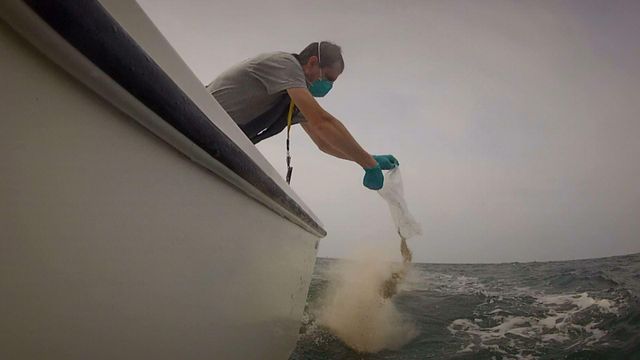When remains unclaimed, NC's dead scattered at sea
Twice a year, Clyde Gibbs Jr. and Joe Marlette meet up at the coast at Morehead City. The men board a boat and head out to sea, but they aren't there to fish.
Posted — UpdatedOnce they get about 4 to 5 miles from the coast, the job begins – scattering the ashes of North Carolina's unclaimed dead.
Since 1973, the North Carolina medical examiner's office has scattered the remains of more than 800 people in the ocean. On Friday, Gibbs and Marlette added 81 more.
"I know pretty much about each one of the cases, as to why we have them and why they are unclaimed," said Gibbs, who works as a medical examiner specialist at the North Carolina Office of the Chief Medical Examiner in Raleigh. "A lot of these people don't have significant others."
In cases where the family can't be located, the ashes are kept for at least three years before being scattered at sea.
Gibbs stores the remains in a walk-in cooler at the ME's office in Raleigh – not because they need to be kept cool, but because that's the only space available.
"The number of unclaimed have kind of been on the rise. We were (scattering ashes in the ocean) every other year, but we're now doing it twice a year to get caught up," he said. "A lot of the families that wind up having bodies that are unclaimed are disconnected, live long distances away, are elderly or don’t have financial means."
The cremated remains are stored in plastic bags and then put in plastic containers and boxed up before Gibbs drives them to Morehead City, where he meets Marlette, a Marine Patrol enforcement officer.
"We’ll load them up on the boat, and we’ll leave right there from our office, our dock," said Marlette, who uses a 26-foot Regulator boat for the job. "You have to be beyond 3 miles to legally dump in the ocean."
Marlette says the process is pretty simple, but he doesn't get involved in the scattering.
"I keep the boat in the wind, because I don’t really want any ashes flying back in my face," he said.
Each container of ashes is marked with the person's name and other identifying information. Families who want details about their loved one's final resting place can get a document from the ME's office showing the date and GPS coordinates of where the ashes were scattered in the ocean.
"A lot of times the families say, 'Well, that’s exactly what the deceased wanted anyway.' In some respects, we are actually fulfilling their wishes," Gibbs said. "We're finally able to put these individuals truly to rest now. They have finally reached their resting place."
• Credits
Copyright 2024 by Capitol Broadcasting Company. All rights reserved. This material may not be published, broadcast, rewritten or redistributed.





